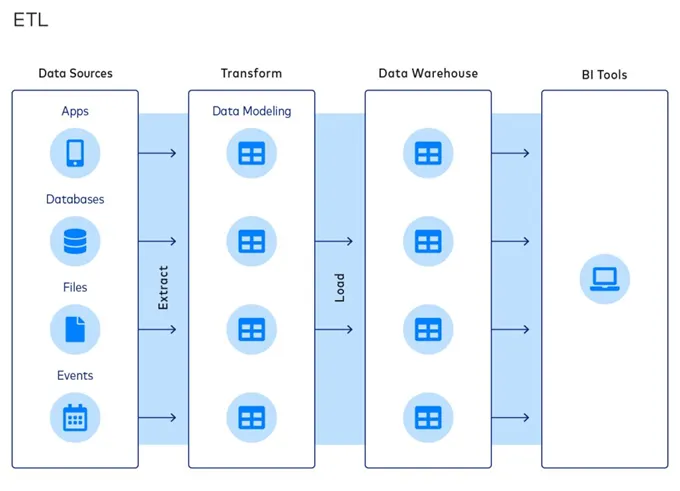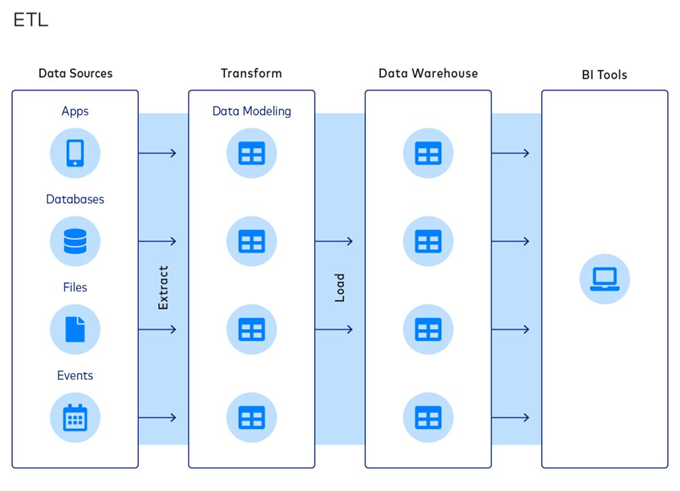
Unlocking Machine Learning Efficiency: The Importance of ETL Tools
With rise in the need for machine learning, the need for robust ETL (Extract, Transform, Load) tools has never been greater. ETL tools play a pivotal role in managing and preparing data for analysis. ETL tools enable companies to gather diverse types of data from multiple sources, transform it into a unified format, and load it into centralized repositories such as Google BigQuery, Snowflake, Databricks, or Azure.
By automating the ETL process, these tools save significant time and effort, allowing you to focus on deriving valuable insights from their data. This automation is essential for machine learning, where high-quality, well-structured data is critical for training accurate and effective models. With the increasing volume, variety, and velocity of data, ETL tools ensure that data scientists and analysts have reliable, clean data to work with, thus accelerating the journey from raw data to actionable intelligence.

Benefits of ETL Tools for Machine Learning
- Save Time and Eliminate Manual Processing: ETL tools automate the collection, transformation, and consolidation of data, significantly reducing the manual workload. For machine learning (ML) projects, this means quicker data preprocessing, allowing data scientists to spend more time on model development and analysis.
- Handle Complex and Diverse Data: ETL tools make it easy to work with various types of data, including time zones, client names, device IDs, and locations. In ML, having clean and well-structured data is crucial for training accurate models. ETL tools streamline this process, ensuring that the data fed into ML algorithms is consistent and reliable.
- Reduce Data Errors: By automating data processing, ETL tools minimize the risk of errors caused by human factors. Accurate data is vital for ML, as errors in data can lead to poor model performance and misleading insights. ETL tools help maintain data integrity, resulting in more robust and reliable ML models.
- Improve Decision-Making: Ensuring high-quality and trustworthy data for analysis leads to better decision-making. In the context of ML, this means that the insights derived from ML models are more accurate and actionable, enabling businesses to make informed decisions based on solid evidence.
- Increase ROI: The efficiency and accuracy provided by ETL tools help businesses save resources and ultimately increase their return on investment. In ML, this translates to faster deployment of models, reduced operational costs, and more effective utilization of data, all contributing to higher overall ROI.
- Enhance Data Accessibility: ETL tools centralize data from multiple sources, making it readily accessible for ML applications. This centralized approach ensures that data scientists and analysts have quick and easy access to the data they need for training models, leading to more efficient workflows and faster iteration cycles.
- Scalability and Flexibility: ETL tools are designed to handle large volumes of data and can easily scale as the data needs of a business grow. This scalability is particularly beneficial for ML projects, which often require processing and analyzing massive datasets to build and refine models.

Conclusion
ETL tools are the backbone of data preparation in machine learning, enabling seamless data integration and ensuring that you can unlock the full potential of their data. ETL tools play a crucial role in streamlining data processes and ensuring data quality, which are essential for successful machine learning applications. By leveraging ETL tools, you can enhance their ML workflows, leading to more accurate models, better insights, and improved decision-making.



